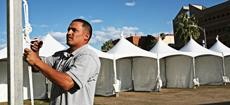Although the UA and the Tucson community are certainly out of touch on some matters, like the appropriate volume for a party, the Tucson Festival of Books is looking to bring together the university and its surrounding community.
“”It’s making a statement,”” said Frank Farias, the executive director of UofA Bookstores and one of the four founders of the Tucson Festival of Books. “”We are part of the general community, and we support the community.””
The festival will take place on the UA campus on March 14 and 15.
In light of recent state education budget cuts, the university is seeking support from the community.
“”The economy has impacted education,”” Farias said, “”We need the community to understand the importance and value of education.””
Bill Viner, CEO of Pepper Viner Homes and one of the festival’s four founders, said the university will also see a small fiscal benefit from the festival.
“”A portion of the funds will go to the university to continuously promote authors to come to campus,”” he said.
“”It all goes back to the community to support literacy,”” Farias said of any profits made through sponsorships. A portion of that given to the university “”would be managed through student affairs … to pay for authors that we bring in throughout the year,”” he said.
In addition, many of the authors coming to visit have a tie to the UA, said Nancy Ledeboer, director of the Pima County Public Library. Of the hundreds of authors, “”probably at least half of them have some connection”” to the UA, she said.
Various UA faculty members will be presenting, as well as UA alumni. According to Ledeboer, the “”most famous”” alumna visiting is J.A. Jance, an award-winning mystery writer.
“”Alumni got involved in this; they have a tent,”” Viner said. “”Twenty different alumni that are coming to their tent, many of which are coming to present at the festival.””
Over 200 people have been involved in the planning phase over the course of the past 18 months, while about another 700 volunteers will be helping with the festival this weekend, Viner said.
“”Our vision was to try and collaborate in trying to promote literacy,”” Farias said. In this sense, the festival will be “”an annual celebration of reading and writing,”” to help “”develop the love of reading books”” in children and offer “”the opportunity to engage with the book authors,”” he said.
“”This is huge, this is a huge event – it is the largest in the southwest region. There’s only one other one that’s larger than this, and that’s in Los Angeles,”” Fabias said.
“”We modeled this one after the LA Times Festival of Books, which is the largest and probably the most well-known in the country,”” Viner said. That festival takes place on the University of California at Los Angeles campus.
“”It was just natural for us to come to the university to duplicate what they had done, but in Tucson,”” Viner said. “”We couldn’t have done it anywhere else at this level as we’ve done it here with this many authors; we would’ve had to have been spread out all over town.””
“”Well there’s a multitude of different connections,”” Farias said, “”Education requires reading and we want to expose small children in our community to reading, for one, and two, we want to expose them to the university.””
“”I think the thing that kind of jumps out at me is that we all consider the UA the core of the educational community in Tucson,”” Viner said.
“”The benefits for the university are enormous,”” Farias said.









